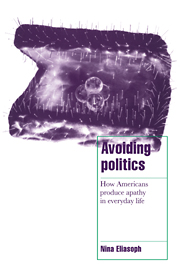Book contents
- Frontmatter
- Contents
- Acknowledgments
- 1 The mysterious shrinking circle of concern
- 2 Volunteers trying to make sense of the world
- 3 “Close to home” and “for the children”: trying really hard not to care
- 4 Humor, nostalgia, and commercial culture in the postmodern public sphere
- 5 Creating ignorance and memorizing facts: how Buffaloes understood politics
- 6 Strenuous disengagement and cynical chic solidarity
- 7 Activists carving out a place in the public sphere for discussion
- 8 Newspapers in the cycle of political evaporation
- 9 The evaporation of politics in the US public sphere
- Appendix 1 Class in the public sphere
- Appendix 2 Method
- Notes
- References
- Index
- Titles in the serious
Appendix 1 - Class in the public sphere
Published online by Cambridge University Press: 17 November 2009
- Frontmatter
- Contents
- Acknowledgments
- 1 The mysterious shrinking circle of concern
- 2 Volunteers trying to make sense of the world
- 3 “Close to home” and “for the children”: trying really hard not to care
- 4 Humor, nostalgia, and commercial culture in the postmodern public sphere
- 5 Creating ignorance and memorizing facts: how Buffaloes understood politics
- 6 Strenuous disengagement and cynical chic solidarity
- 7 Activists carving out a place in the public sphere for discussion
- 8 Newspapers in the cycle of political evaporation
- 9 The evaporation of politics in the US public sphere
- Appendix 1 Class in the public sphere
- Appendix 2 Method
- Notes
- References
- Index
- Titles in the serious
Summary
One typical kind of sociological argument examines a causal link between individual members' class background and political engagement. It would show how hidden structural forces inexorably work on people, steering them toward this kind of group, away from that. Such research would look at members' class, look at their political participation, see how they correlate, perhaps correlate these figures with some other “objective” measures, and call it a day (Verba and Nie's 1972 classic, for example). If I had focused on class, I would have shown how or if groups take on class-linked characteristics, and then how members interpret their class positions, as another “relation to authorities and institutions.” This would have been one good way of doing this study.
I had empirical and theoretical reasons for not doing that. First, empirically, it is impossible to control for class in real civic groups in the US; I had originally planned on doing so, and then decided it was impossible, and then, in a way, inadvertently succeeded in doing so, anyway. Class differences between the different types of groups were minimal, especially between the activists and volunteers. Volunteers in the schools and anti-drugs groups included: three schoolteachers, one corporate scientist, one local realtor, two full-time homemakers (both with two years of college), some pink-collar workers. Activists in the anti-toxics group included, among others: two schoolteachers, one corporate scientist, one local realtor, two full-time homemakers (neither with college backgrounds, though one started going to community college to learn about environmental issues after a year in the group – being in the group helped change her class ethos), some pink-collar workers; in other words, if we lined up activists and volunteers, we could couple off a Noah's Ark of paired occupations.
- Type
- Chapter
- Information
- Avoiding PoliticsHow Americans Produce Apathy in Everyday Life, pp. 264 - 268Publisher: Cambridge University PressPrint publication year: 1998

